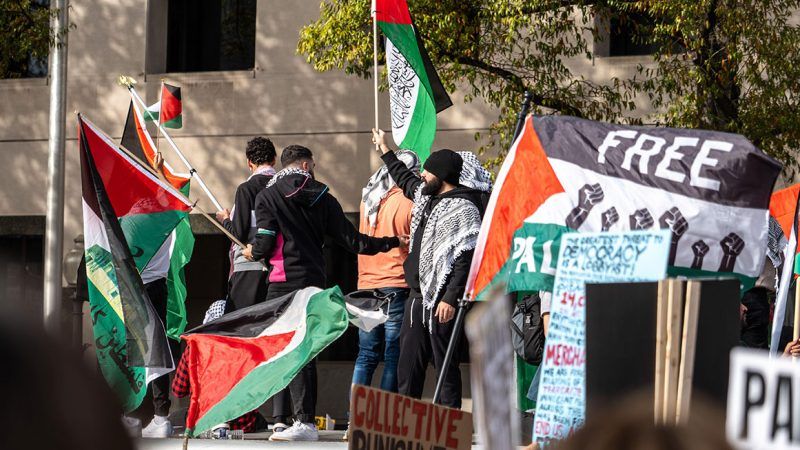Pro-Palestinian Speech Is Still Free Speech
Republicans should remember that they have spent years railing against censorship on college campuses.

The Israeli-Palestinian conflict is unfolding half a world away, yet virtually no other political issue inspires as much acrimony among U.S. college students. After the terrorist group Hamas killed approximately 1,200 people in Israel on October 7, Israeli forces responded by bombing the Gaza Strip, killing thousands of Palestinians.* In response, American college campuses witnessed a surge of pro-Palestinian activism—as well as repeated efforts to silence the activists.
One need not agree with those students' slogans, their tactics, or their goals to recognize that provocative political speech is protected by the First Amendment. Republican political figures who have spent years railing against censorship and cancel culture would do well to remember that.
Take Florida Gov. Ron DeSantis, a candidate for the 2024 GOP presidential nomination. On October 24, State University System of Florida Chancellor Ray Rodrigues ordered two chapters of Students for Justice in Palestine (SJP) to disband, citing the governor's authority to prohibit any group that knowingly provides "material support" to a terrorist group.
SJP's speech deserves criticism; a toolkit circulated by the group does in fact celebrate the slaughter of Israeli citizens on October 7 as "a historic win for the Palestinian resistance." It's foolish to see the indiscriminate killing of civilians as anything other than terrorism, but pro-Palestinian students have an ironclad First Amendment right to express that heinous view—something Rodrigues belatedly realized after soliciting legal advice. "We have reviewed those opinions, and in short, they raise concerns about potential personal liability for university actors who deactivate the student-registered organization," he explained in a statement. In other words, Florida administrators decided it wasn't worth the headache.
Other campuses have taken dubious actions without any nudging from politicians. Columbia University suspended two pro-Palestinian student groups, SJP and Jewish Voice for Peace, ostensibly for holding an unauthorized event. Rockland Community College in New York suspended a student after she shouted "from the river to the sea, Palestine will be free" and "Jews for Palestine" at a pro-Israel event.
Commentators calling for the suppression of pro-Palestinian activism have frequently cited the fact that some Jewish students have felt unsafe on campuses. Certainly, college administrators should investigate and try to prevent actual threats of violence against all students. But free speech principles do not take a vacation merely because the speech in question is hurtful; there is no hate speech exception to the First Amendment. Republicans appeared to understand this reality when administrators censored conservative speech, yet now they are pining for safe spaces.
Indeed, the November 8 Republican presidential debate was a veritable celebration of censorship, with Nikki Haley, Chris Christie, and DeSantis all promising to punish pro-Palestinian speech. A notable exception was Vivek Ramaswamy, who called out his opponents for their hypocrisy on anti-Israel advocacy. "We don't quash this with censorship, because that creates a worse underbelly," he said. "We quell it through leadership by calling it out."
CORRECTION: This article initially misstated the number of civilians killed by Hamas. Approximately 800 civilians and 400 members of Israeli security forces died on October 7.


Show Comments (153)